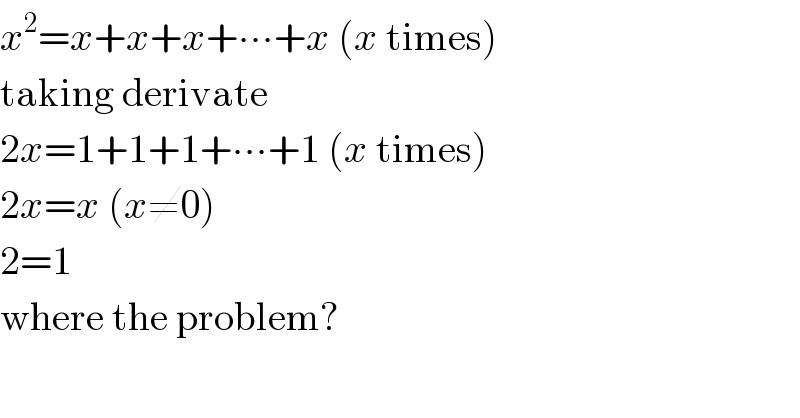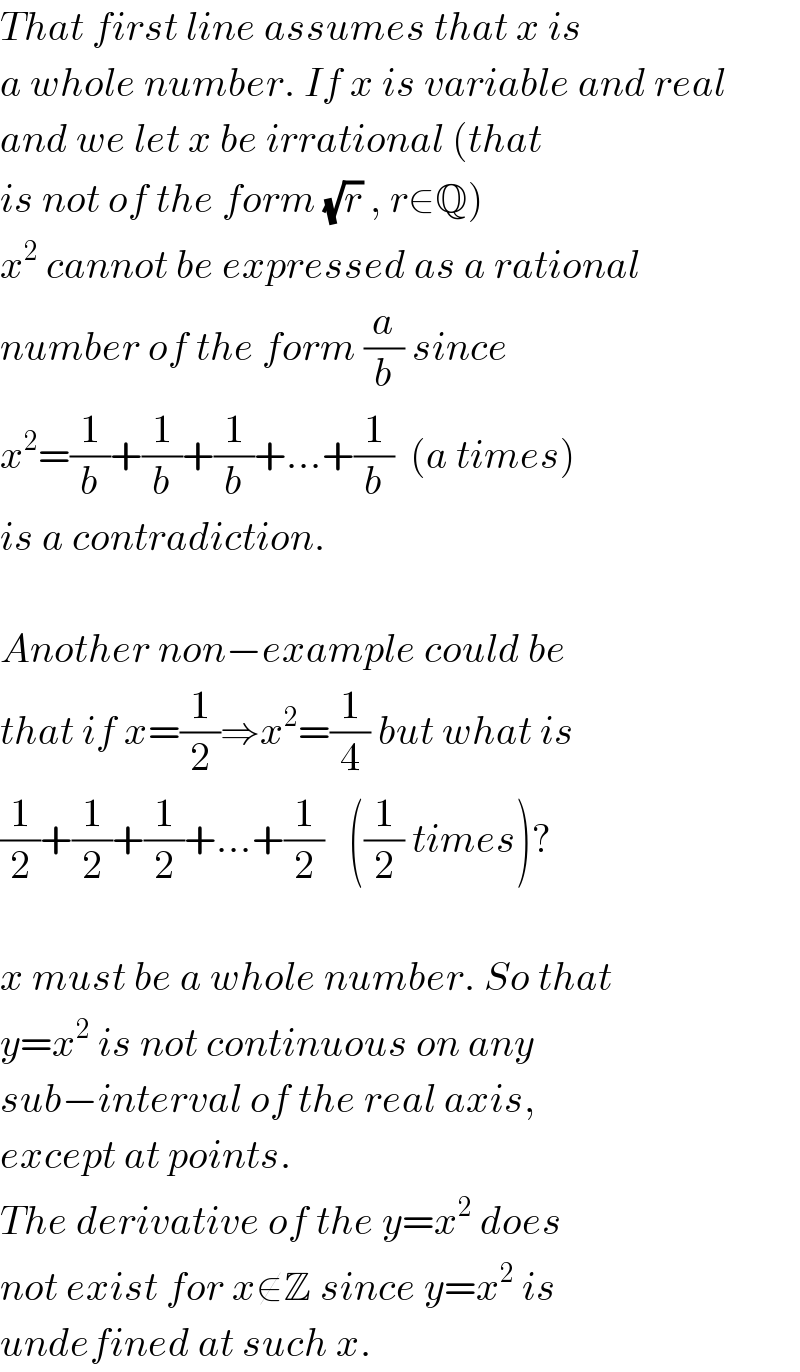
Question Number 2851 by 123456 last updated on 28/Nov/15

$${x}^{\mathrm{2}} ={x}+{x}+{x}+\centerdot\centerdot\centerdot+{x}\:\left({x}\:\mathrm{times}\right) \\ $$$$\mathrm{taking}\:\mathrm{derivate} \\ $$$$\mathrm{2}{x}=\mathrm{1}+\mathrm{1}+\mathrm{1}+\centerdot\centerdot\centerdot+\mathrm{1}\:\left({x}\:\mathrm{times}\right) \\ $$$$\mathrm{2}{x}={x}\:\left({x}\neq\mathrm{0}\right) \\ $$$$\mathrm{2}=\mathrm{1} \\ $$$$\mathrm{where}\:\mathrm{the}\:\mathrm{problem}? \\ $$
Commented by Yozzi last updated on 29/Nov/15

$${That}\:{first}\:{line}\:{assumes}\:{that}\:{x}\:{is}\: \\ $$$${a}\:{whole}\:{number}.\:{If}\:{x}\:{is}\:{variable}\:{and}\:{real} \\ $$$${and}\:{we}\:{let}\:{x}\:{be}\:{irrational}\:\left({that}\:\right. \\ $$$$\left.{is}\:{not}\:{of}\:{the}\:{form}\:\sqrt{{r}}\:,\:{r}\in\mathbb{Q}\right) \\ $$$${x}^{\mathrm{2}} \:{cannot}\:{be}\:{expressed}\:{as}\:{a}\:{rational} \\ $$$${number}\:{of}\:{the}\:{form}\:\frac{{a}}{{b}}\:{since} \\ $$$${x}^{\mathrm{2}} =\frac{\mathrm{1}}{{b}}+\frac{\mathrm{1}}{{b}}+\frac{\mathrm{1}}{{b}}+...+\frac{\mathrm{1}}{{b}}\:\:\left({a}\:{times}\right) \\ $$$${is}\:{a}\:{contradiction}.\: \\ $$$$ \\ $$$${Another}\:{non}−{example}\:{could}\:{be}\: \\ $$$${that}\:{if}\:{x}=\frac{\mathrm{1}}{\mathrm{2}}\Rightarrow{x}^{\mathrm{2}} =\frac{\mathrm{1}}{\mathrm{4}}\:{but}\:{what}\:{is} \\ $$$$\frac{\mathrm{1}}{\mathrm{2}}+\frac{\mathrm{1}}{\mathrm{2}}+\frac{\mathrm{1}}{\mathrm{2}}+...+\frac{\mathrm{1}}{\mathrm{2}}\:\:\:\left(\frac{\mathrm{1}}{\mathrm{2}}\:{times}\right)? \\ $$$$ \\ $$$${x}\:{must}\:{be}\:{a}\:{whole}\:{number}.\:{So}\:{that} \\ $$$${y}={x}^{\mathrm{2}} \:{is}\:{not}\:{continuous}\:{on}\:{any}\: \\ $$$${sub}−{interval}\:{of}\:{the}\:{real}\:{axis}, \\ $$$${except}\:{at}\:{points}. \\ $$$${The}\:{derivative}\:{of}\:{the}\:{y}={x}^{\mathrm{2}} \:{does} \\ $$$${not}\:{exist}\:{for}\:{x}\notin\mathbb{Z}\:{since}\:{y}={x}^{\mathrm{2}} \:{is}\: \\ $$$${undefined}\:{at}\:{such}\:{x}. \\ $$
Commented by Yozzi last updated on 29/Nov/15

$${Let}\:{f}\left({x}\right)=\begin{cases}{{x}^{\mathrm{2}} \:\:\:{x}\in\mathbb{Z}^{+} }\\{\mathrm{0}\:\:\:\:{otherwise}}\end{cases} \\ $$
Commented by Rasheed Soomro last updated on 29/Nov/15

$$\mathcal{V}{ery}\:\mathcal{N}{ice}! \\ $$
